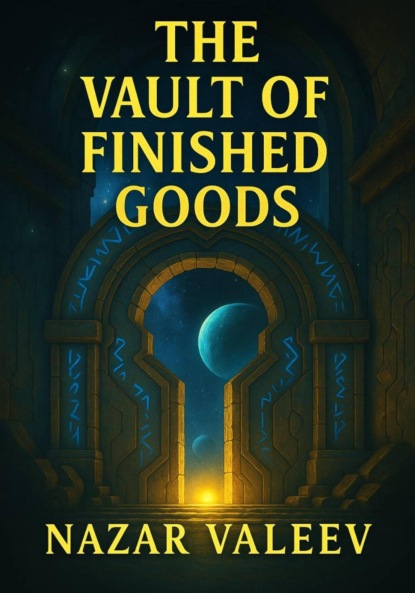The Vault of Finished Goods

- -
- 100%
- +

Foreword
Sometimes the fate of a world is shaped not in council chambers or official offices, not by vast armies or the hush of secret laboratories. Sometimes, it rests entirely on the awkward steps of a single being.
He was no hero. He knew nothing of battle, wore no uniform, no badge of honor. He never quoted great thinkers; he had never even been to school – there was simply no school on the orbital station where he lived. His only teachers were the dust-covered archives of a long-extinct race… and an old wrench.
He found his way into the crew almost by accident. No one had been looking for him or calling for him; he simply appeared, as if drawn by some strange logic known only to himself. And he stayed. At first – unnecessary, then – useful, and with time – one of their own.
He repaired what others could not, hauled heavy crates while the rest argued, and remained close, even when the fear was almost too much to bear. He did not know how to joke, yet somehow, he made others laugh – most often unintentionally, but always sincerely.
And yes, more often than not, he was exactly where he was needed. No one could say when it happened, but without him, their small crew would no longer have been whole.
He never sought glory. He simply did what he believed had to be done – sometimes with grumbling, sometimes with unexpected courage, and sometimes with such touching honesty and warmth that even the most skeptical at first felt a sting of tears at the corners of their eyes.
Had he been human, he would probably have worn a shirt two sizes too large, just to have somewhere to hide his soul. But he was a smorg, and smorgs do not wear their hearts on their sleeves. Their souls live quietly within, like a dependable battery that silently charges everyone around it.
And then it all came to an end – the war faded, the dreadful Veliars seemed to vanish, and the world breathed freely once more.
The old, beloved crew scattered for a while, each to their own path. The ship, the very one that had saved more than a single civilization, remained in orbit. Almost empty.
Almost.
For if one lingered in the corridor just a little longer than usual, especially at night, when the whole ship drifted in a hushed half-slumber, one could hear him in the engineering bay. Tools clinking, adjusting something here, dismantling and reassembling something there, even if it had never truly been broken.
Sometimes he simply walks, unhurried, along the walls, as if strolling through familiar streets he has never seen. And sometimes he speaks, softly, as though testing whether there is someone nearby who might hear. Or perhaps just to steady himself, soothed by the sound of his own voice.
He does not try to impress, nor does he ask to be heard. He merely knows that stories, like life, are not meant to be locked away for too long. Even if you are the last, it does not mean that everything ends with you.
«It’s never too late to put your tools back on the shelf», Smorg once recalled an old friend saying. «But what if somewhere there is still a door waiting to be opened? A light that can still be fixed and lit? And perhaps, someday, someone will find what you created and preserved for them. Which means it was all worth it – a hundred times over!»
Chapter I. The Last One Aboard
When the Armaon settled into a stationary orbit above one of the trading stations of the planet Tlaan in the Vriin system, the silence inside the ship became almost tangible. The spacious compartments, once alive with voices, footsteps, the chime of instruments and the laughter of friends, now felt like a museum, sealed beneath an invisible glass case.
Smorg wandered through the empty corridors, not knowing what to do with himself. Out of habit, he still wore his old tool belt. He could not even recall the last time he had used it to fix anything. Perhaps it had been when his old friend Kane broke the door of the regeneration capsule and then insisted that «it was like that already.»
The mess hall felt strangely deserted. He flopped awkwardly onto the couch and stared up at the ceiling, where beneath the dome a soft pink Bajjarian pearl glimmered faintly. Tiny lights twinkled around it – someone must have held a little farewell celebration here and forgotten to switch off the garland.
«Well then», Smorg murmured sadly to no one in particular, «alone I am here. Not that I’m not used to it.»
«Technically, I am here as well», replied Arma, who had long since outgrown her nominal status as an AI and become the very soul and a trusted member of the Armaon’s crew. Her voice, as always, was calm, yet there was something in it that resembled sympathy.
Smorg glanced sideways at the nearest panel.
«Am I… bothering you?»
«Not unless you decide to turn my communications module into ‘something more useful.’ In that case – yes, very much.»
«I was going to, but you locked the toolbox. Only temporary it was supposed to be!» Smorg muttered, puffing up a little. It looked rather touching. He shifted on the couch, rubbed his knees with both hands, then lifted his gaze to the pearl, and after that to the screen where the outline of a yellow-green planet shimmered faintly.
«I was thinking… How should I put this… I wish I could go home.»
«You mean your homeworld? The one you’ve never actually been to? The one now buried under dust storms, where, most likely, some ghastly remnants of a long-abandoned civilization wander about? Although even they have probably perished by now – out of sheer loneliness and despair.»
«Yes. There». He scratched the back of his head. «I… just… I really want to find something there. I read about it in our old archives – a storage place. Well, not exactly a storage place… The one I once told you about. Smorgs called it… um… the Vault of Finished Goods!»
«You’re serious?»
«Why not? It’s a convenient name. And concise. Where everything is neatly laid out, labelled, and shining!»
«You want to travel to a dead planet, all on your own, to look for treasures every adventurer and treasure-hunter within five light-years dreams of?»
«Yes. We… we could go there together!» Smorg declared with sudden determination, then faltered. «Well… there isn’t really any other way, is there…»
He got up and headed for the bridge. «No one else is here but you and me anyway…»
For some time, Arma remained silent, as if sulking, then began slowly switching on the lights. Soon the navigation beacons on the forward deck lit up as well, casting their glow through the viewports onto the nearby docks. The ship seemed to breathe, as if awakening from sleep.
«Course set», Arma reported shortly after. «Well then, we take a heading for the Smorg home system. Travel time: twelve days. Turbulence is possible, as well as excessive radiation upon atmospheric entry. And I suppose there is little point in mentioning any sort of percentage of finding an intact vault of precious stones…»
Smorg nodded, as if everything he had just heard matched precisely with his own internal plan. He stood by the viewport for a moment, then said quietly:
«No one has really been there… not since then.»
«Almost no one», Arma replied. «Several expeditions were recorded, but none of them returned.»
Smorg fell into thought. Then, still looking at the stars, he added:
«Maybe they just weren’t looking in the right place.»
«That, I fully agree with», Arma replied in the same tone. «‘Not in the right place’ is precisely what comes to mind whenever such planets are mentioned.»
Smorg pretended he was no longer listening to her and settled down at the viewing alcove in the mess hall, from there it was convenient to gaze into the depths of space and not get in the way of the other crew members, who on ordinary busy days would rush back and forth along the ship on their errands… or non-errands. Getting comfortable and stretching out his legs, he gripped the handrail firmly, as if that could somehow help the ship fly faster.
The ship picked up impulse, and the stars began to stretch into long, narrow threads – the Armaon was entering faster-than-light mode. Toward the place that had once been his home, and where, perhaps, something of it might still remain.
Chapter II. A World Under the Vast Sky
Before the Genomode annihilated the world of the Smorgs, their planet had known no war, no oppression, and no fear of the days to come. It grew, it unfolded, and it breathed as a living organism breathes, moved by clarity of thought and a faith in creation.
The Smorgs were a people unhurried and deliberate. They did not strive to seize the cosmic reaches, yet they knew how to comprehend them. Their civilization stretched not upward, but outward, and they sought not expansion, but a deep, almost philosophical mastery of what was already theirs by the right of reason.
The cities of the Smorgs were broad and rounded, as though their architects had drawn inspiration from wildflowers and the natural symmetries of living forms. Their buildings followed a principle of centripetal harmony, each district a complete little world of its own, in which they lived, worked, learned, and rested together without breaking the bonds between them. They avoided tall structures. The ground floor was always raised upon massive supports, so the earth could breathe, with paths laid between curved columns, streams flowing through them, gardens and fountains stretching in the shade beneath the overhanging levels.

The Smorgs never separated nature from technology. Their energy systems were powered by the cyclotronic reaction of moving water, and their food was created in specialized biocentres, where perfectly balanced components were synthesized without destroying living natural resources. And all this powerful infrastructure was woven into the texture of nature – not suppressing it, but emphasizing it.
The majestic spaceports were built as floating platforms. When necessary, they could be moved beyond the borders of the metropolis or sealed beneath a protective dome. In earlier centuries, Trianna had often suffered from meteor showers and fragments of asteroid streams, and such measures helped safeguard ships and starcraft. No such threats had been observed over the last two hundred years, yet the Smorgs continued to design their spaceports according to the same principles – not out of superstition, but as a tribute to an engineering tradition in which the past became not a burden, but experience worthy of respect.
The platforms were equipped with independent swarctronic stabilizers which, in the event of an alert, could be shut down automatically, allowing the structure to be sheltered beneath the dome or carried away along a safe atmospheric trajectory.
Every joint, every engineering node was like a line written in an elegant yet logical language. The world of the Smorgs was an aesthetic expression of balance between knowledge and the reverence owed to the unknown. Yet greatness, in their understanding, did not lie in technology or scientific achievement. Their true pride was their society.
The Smorgs rejected hierarchy. Their system of governance was founded on Circles of Clear Councils, large and small, where each took part according to their field, their way of seeing the world, or their inner vision: engineer, researcher, philosopher, observer. Elders did not command – they interpreted. The younger did not obey – they reflected. The ideal was not the hero, but the master jeweler, the master gardener, or the master navigator… Mastery was not so much a profession as a state of spirit.
In school halls, learning was pursued not for the sake of a career, but for the sake of understanding. Lessons and early knowledge were not reduced to memorization, but rather to a dialogue with the world. A pupil who discovered a new way to describe water became as much a hero as a geological scout who found a new mineral or a rich rare-earth vein on a neighboring planet.
Yet no philosophy, no refinement of engineering thought, and no reverence for nature could save them from the horrific Genomode – a deadly virus that emerged suddenly, like a black shadow, like a misplaced variable in the familiar equation of the world. Its effect was subtle, gradual, and utterly fatal. Not one of the initially surviving Smorgs left the planet – all understood there would not be enough ships for everyone, and so, without arrangement or command, they chose to stay.
Trianna, once the shining heart of Smorg civilization, sank into silence with terrifying speed: the Genomode worked soundlessly and mercilessly. No bells of alarm, no sirens – only sudden breaks in communication, the silence of laboratories, and the fading lights of festive domes. At first, the count was in weeks, and then, in days.
Only a small handful of Smorgs survived, those who happened to be on orbital stations: communications engineers, operators of navigation complexes, a few star patrol units with scientific observers, as well as groups of researchers stationed on the three conditionally habitable planets of the system: Veltora, covered entirely in salt deserts and hollow ridges; treacherous, humid Veilid, known for its unstable biosphere and low gravity threshold; and Unra – lifeless, barren, the farthest planet from the star, rich in diverse resources.
In time, some of the Smorgs left their system. Some – aboard the remaining ships of scientific missions, others – in the escape shuttles of the orbital stations. They felt like exiles, abandoning the ruins of their homeland. But the world beyond did not greet them as the saved, but as the damned.
No one listened to the Smorgs anymore, no one asked them questions or tried to understand their explanations. They were simply accused, and the accusations were furious and many. They were seen as those who had erased their own civilization from the face of the world, destroyers who had created the deadly genome-virus. Their restrained, careful and honest attempts to explain the tragedy were regarded as pitiful excuses. And restraint, as is well known, always loses to rage.
The Smorgs were strong in the sciences, especially in substance synthesis, the creation of molecular templates, genetic engineering, and biosymbiotic cloning. And, as so often happens, their abilities attracted those who sought profit and gain, not meaning. Criminal cartels, shadow corporations, arms dealers – all quickly understood how much could be extracted from the Smorgs. It was enough to offer them the illusion of understanding, or a meagre imitation of a homeland, and the Smorgs agreed. In truth, they had no real choice in this difficult struggle for survival. And there was also the naïve belief that one day they would once again be accepted as equals. And when their developments and discoveries led to tragedies, no one cared who had truly been behind those projects – the blame, unquestionably, fell upon them, the Smorgs.
Thus, all too quickly, the reputation of a great people, once honored for clarity of thought, humility, and remarkable scientific achievement, turned into an indelible mark. The Smorgs became a symbol of ruin, an example of failure, and a warning. In some archives – a case of galactic tragedy, in the mentions of others – proof that the Smorgs were dangerous.
Yet those who survived the catastrophe preserved something timidly within their minds – not so much the memory of former greatness, as the feeling of a truth which, though lost, had not vanished. It was merely waiting for the moment when someone would find it again.
Chapter III. A Twelve-Day Flight of Smorgian Thought
For an average human, an entire lifetime may not be enough to realize just how fleeting and trivial everything truly is. Smorg, however, needed only a few hours. By the end of the second day, Arma had fully begun to grasp what it meant to be trapped in a confined space with an omnipresent Smorg, and that the cosmic vacuum beyond the hull was not the worst place to eject all her blocks, processors, matrices, and integrated circuits into, letting them vanish without a trace in the endless reaches of the universe.
«You know», Smorg said thoughtfully, sitting down in the middle of the corridor in the engineering section with a plate of protein wafers and his favorite compote, «if everything in the universe exists in cycles, then our life is just a glitch in the system. A short and accidental glitch. Just a temporary burst of entropy… with eyes.»
«How long have you been awake?» Arma asked with a hint of concern. «Or did you just finish sleeping and now intend to take full revenge on the universe for arranging things this way?»
«I am in contemplation mode», Smorg announced. «It’s like meditation, only with questions.»
«Not long ago you were interested in the correlation between ‘space–time’ and ‘fluctuational curvature’», Arma reminded him.
«Well, that unusual comparison led me to certain thoughts», Smorg replied pensively. «I think space–time bends toward wherever it is better understood!»
Arma turned off her internal lighting so Smorg would think she had entered deep diagnostics and would not be back any time soon.
On the third day, Smorg began constructing a model of a cosmic bubble out of synthetic jelly. He claimed that this made it much easier to comprehend the boundaries of the void.
«The question is not what we are, but who hears us», he declared profoundly, sitting on the floor in the corridor and running his fingers thoughtfully up and down the ventilation grille. «For if no one hears us, then we are nothing but an empty monologue!»
«You are talking to a ship», Arma reminded him. «To the ship, not to me.»
«Yes. But that means I am not talking to myself! I am the monologue, and the ship is the acoustic surface. Which makes it a dialogue.»
«Amusing», Arma replied. «So anyone who hears you becomes part of your reality?»
«Perhaps», Smorg agreed. «By the way, I remember you once said that emptiness is when you send out a signal, and even the echo chooses to remain in silence. What a profound thought!»
He fell silent for a moment and traced his finger along the glowing line on the floor, as if reading a forgotten story written upon it.
«I used to love watching the old Smorg recordings play inside the archive capsules. They spoke simply, clearly. I listened closely, tried to remember everything, so that one day I could speak the same way.»
«Well, now you are speaking. Quite a lot, in fact», Arma observed.
«Yes», he said. «It’s just that… if I stop talking, I will hear too loudly that I am alone.»
On the fourth day, Smorg decided to visualize one of the logistical problems they had encountered during their expedition to the planet of the Servants. He carefully laid out on the workbench a schematic of the events using resistors, microcontrollers, capacitors, and even a couple of old gears. Each component represented a key element of the issue: here – the numerous transports abandoned in orbit around the artificial planet, here – the failures in the power circuit, and in the center – a tiny piece of soldered wire with a crooked inscription: «A hope for success.» He wrote the letters slowly, with a deep engineer’s sorrow.
«And this is you», Smorg said, pointing at the central stabilizer. «You have zero resistance and zero emotion.»
«A lovely compliment», Arma responded. «I believe I’ll upload it into my self-esteem module.»
On the fifth day, Smorg held a meeting. He sat at the head of the table in the mess hall with an air of great importance, holding in his hand a large glass of extra-aged green liqueur from the laboratory. In the two chairs opposite, the maintenance biodrones had settled comfortably. From across the table only their upper halves were visible, which made them look especially endearing partly due to their spherical shapes and oval lenses that regarded him with a sort of sad, yet understanding expression, as if they knew they were about to be entrusted with something significant.
«I believe our expedition must strictly adhere to the assigned course», Smorg finally proclaimed. «All in favor – remain silent.»
The silence was deafening.
On the sixth day, Smorg remembered an old friend, the ever-carefree human, Kane:
«He once said: ‘If a projectile is flying straight at you, it means you’re standing still.’»
«I believe that was his rather simple way of speaking about the necessity of maneuvering», Arma offered by way of clarification.
«Perhaps. Or perhaps he meant some other necessity? For example, the necessity of choice? After all, in life, just as in battle, danger arises when one does not move.»
«And that is how legends of sages and universal insight are born», Arma replied. «Though, most likely, Kane was simply being himself and delivered yet another of his ‘I say what I see’ lines.»
By the seventh day, a hidden entry appeared in Arma’s system log:
«Smorg is generally stable insofar as that is possible after yet another encounter with the laboratory’s green liqueur. Level of chatter remains above the average statistical threshold. A pity that the physiology of organic beings does not include a remote internal noise-cancellation module.»
On the eighth day, Smorg attempted to study the etymology of his language. At his request, Arma connected the planetary linguistics library and discovered that the earliest recorded Smorg phrase went something like: «Ouch.»
«Yes, that explains a lot», Smorg sighed.
On the ninth day, Smorg was mostly silent. Arma marked this as a potential drop in emotional activity and braced for something extraordinary, for Smorg’s silence usually concealed something epic, however entirely unformalizable it might be.
He sat by the wall, his forehead pressed against a panel as if he intended to drill through it by the power of thought alone. Then he straightened and proclaimed solemnly:
«It seems that somewhere at the center of the universe there is… a hole. And it is incredibly insidious in its very nature.»
«Not impossible», Arma replied. «Experience shows that if the universe can contain some insidious hole, then it certainly will. Take those wormholes we once happened to visit, for instance.»
«I mean something else», Smorg said. «A completely through-and-through hole into the great Nothing, where everything important seeps away.»
«Seeps away from whom?» Arma asked, just to be sure.
«From everyone. From living beings. From machines. Even from sealed food.» Smorg pointed at the line showing the weight. «There’s always less in the package than it says.»
«Now, about the structure of these losses», Smorg continued thoughtfully, «sometimes I feel that dreams seep away too. At night you see something important, and in the morning – no dream, no memory.»
«That is called forgetfulness», Arma noted. «And it isn’t necessarily connected with your strange hole. But I understand.»
She fell silent, then added a little more quietly than before:
«If I had a dream, I think… I wouldn’t want to lose it.»
He smiled. And in her tone, not in the words themselves, but somewhere between them, there was something almost familiar, almost dear.
The silence that followed was not mere absence of sound. It was a silence of understanding and solidarity.
On the tenth day, Smorg attempted a «test launch.» In the engine bay he discovered a panel with blinking indicators and announced that he had a reliable plan to make the ship go faster. He pressed three multicolored buttons, twisted the synchronizer knob, and then returned to the bridge, settling into the captain’s chair. A short while later, Arma was forced to activate lockout mode. A little more and the ship would have dropped out of faster-than-light travel and ended up in the Karmorden system, where, after the recent supernova explosion, venturing would have been sheer madness.
«But I only wanted to help», Smorg said, slightly hurt, looking up at the pink pearl beneath the ceiling.
«Oh, I will gladly tell you how you can help», Arma replied. «Just don’t touch anything.»



